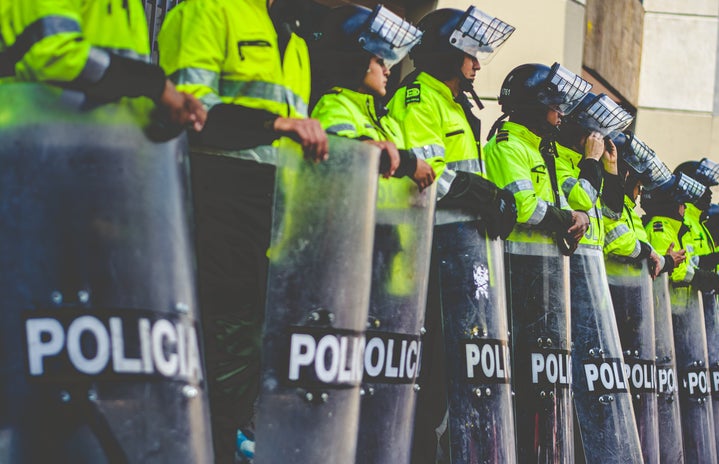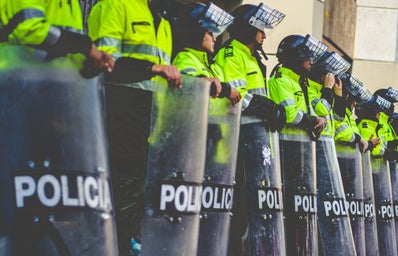Brooklyn Nine-Nine has been a longtime favorite sitcom of mine. I relate to Amy Santiago’s constant need for organization, Jake’s perpetual mess-ups, and of course, Gina’s casual narcissism. The show is also a great model for diversity and representation on mainstream television. Recently though, I’ve been second guessing it’s underlying impact. In one of my classes at American University, we’ve been learning about the functions of comedy and as I delve deeper into the topic, it makes me question the function of police comedy in Brooklyn Nine-Nine, specifically.
The superiority theory of comedy states that it serves as a way to deflate intimidating structures in society that we feel we have little to no control over, so we can better cope with their impact in our daily lives. Police are currently and always have been a source of great fear, especially for minority communities in America, because they represent and enforce racist, patriarchal, and capitalist oppression. From their start as a slave catching organization, to the Stonewall Riots in 1969, and to the recent murders of BIPOC– the police have thrived off of intimidation and fear. No matter how hard people try to resist or change the system, like the 1992 LA riots or the Black Lives Matter Movement in 2016 and 2020, things have seemed to stay the same. The hopelessness fuels laughter and that laughter helps people relieve some of their stress.

All of the acts of misconduct in the show are brushed off as a workplace annoyance instead of a serious violation of protocol. For example, in the episode “48 hours” Jake Peralta claims that he is “100% sure” the suspect is a man named Dustin Whitman because Peralta had previously dealt with Whitman and the crime scene fit his profile perfectly. When Peralta takes his findings to the Captain, the Captain responds, “Well, let’s see what kind of physical evidence they turn up and then we’ll talk arrest,” to which Jake responds “Actually… hilarious story,” and when the camera pans to the holding cell, Peralta announces “that’s Dustin Whitman.”
To break that situation down further, Detective Peralta arrested a civilian without any concrete evidence which is a violation of Whitman’s civil liberties. Peralta has to enlist his co-workers to help him dig for evidence before Whitman’s 48-hour hold is over causing them to groan and grunt about it for the entire episode which frames this as a workplace mishap rather than the grave violation of civil liberties that it is. In their defense, the show wouldn’t be much of a comedy if they addressed the severity of the situation, but then again, maybe a police precinct isn’t the right setting for this type of show.

While the comedy in Brooklyn Nine-Nine normalizes some acts of misconduct, it also normalizes positive interactions with the police. All of the detectives on the show are written as well intentioned “good cops.” While this will never fix the systemic issues with policing, it could inspire more cops to be “good cops” which is at least a step in the right direction. They also do dedicate one episode to address, or attempt to address, racism in policing.

However, singling out one episode as the “serious episode” to discuss issues of race and police misconduct lulls the viewer into a false sense of security. Since they address police misconduct in this episode, they have positioned themselves against the issue making the audience think that all of the other episodes are full of above the board policing. This obviously isn’t the case.
I’m not urging you to give up the show all together because I for sure won’t, I’m simply suggesting that you should be aware of the content you are consuming and think critically about how it affects your worldview.
Photo Credit: Her Campus Media Library



